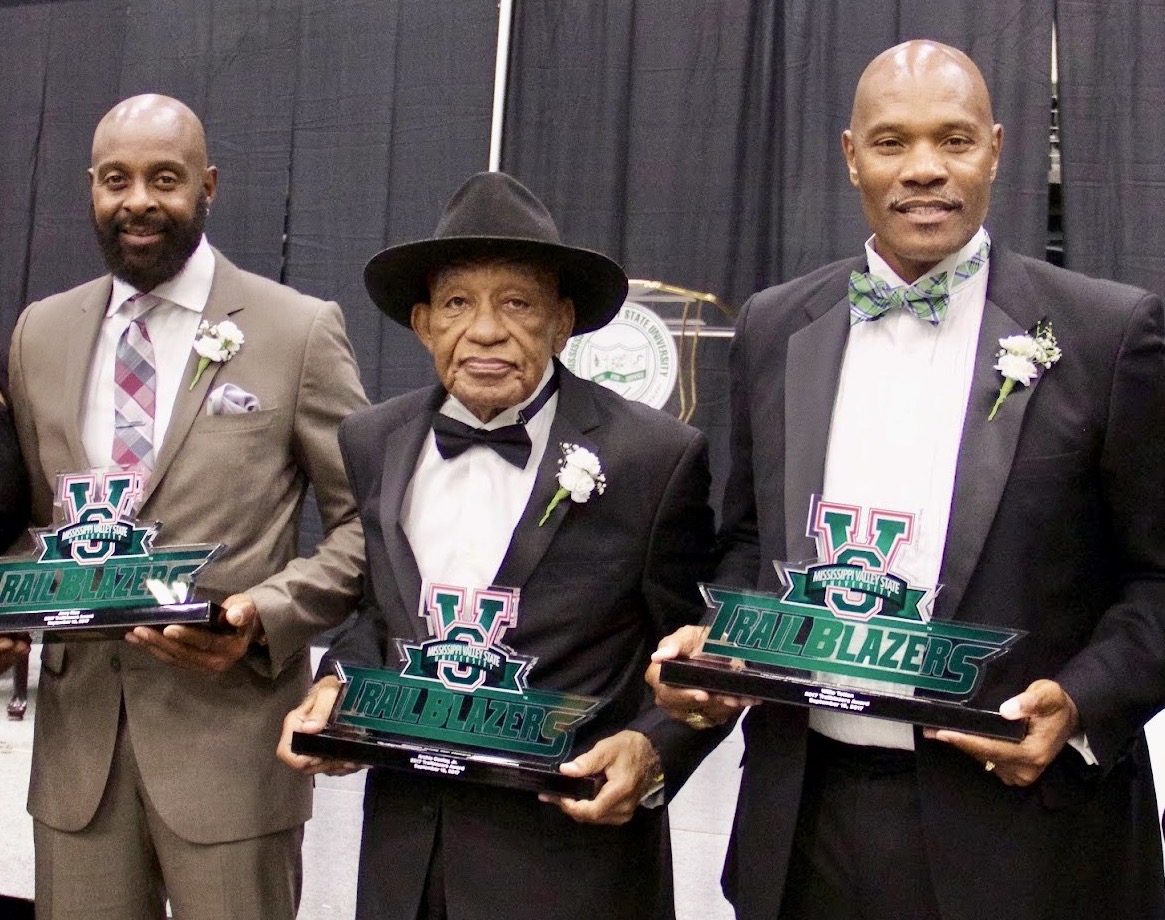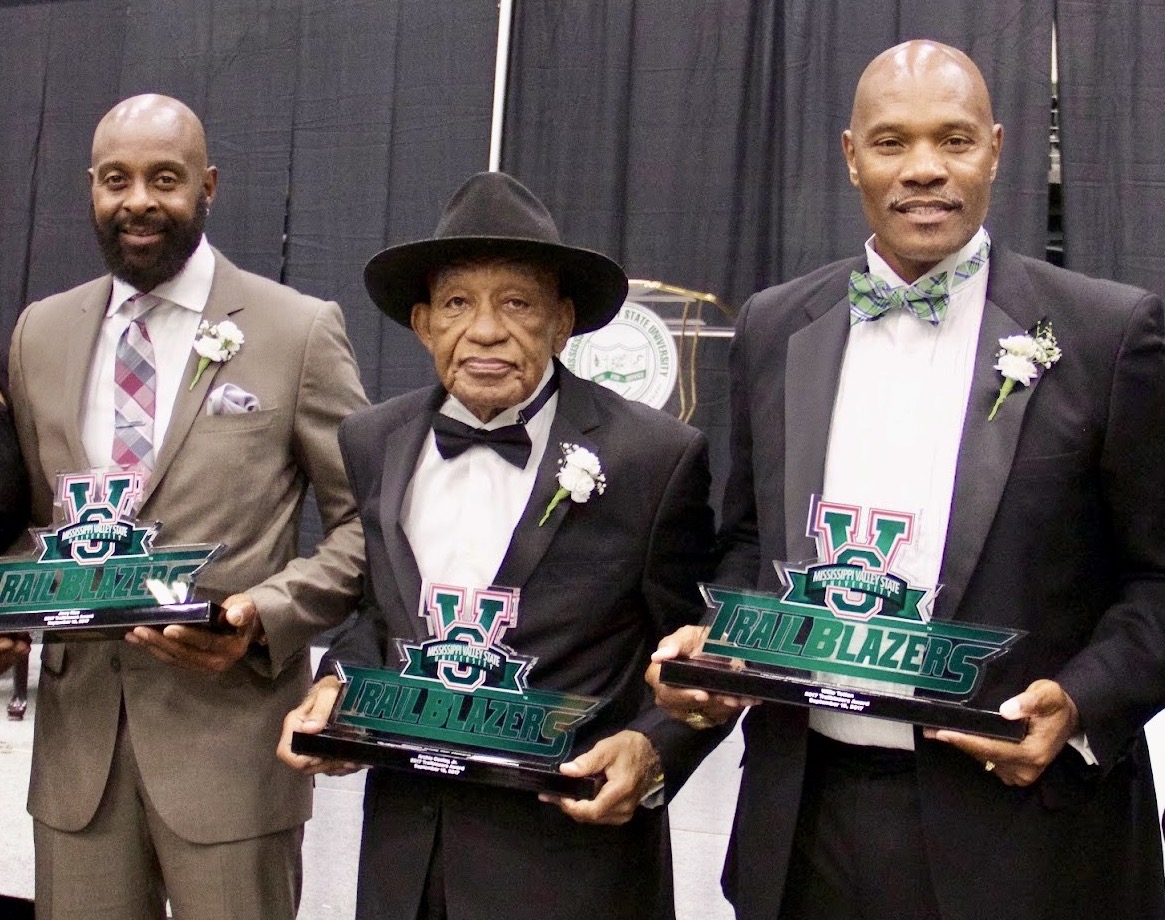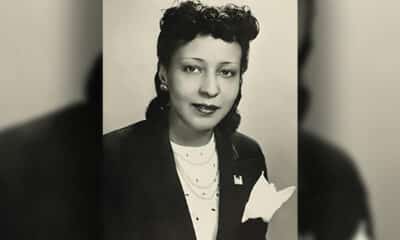Mississippi Today
Remembering ‘The Gunslinger’ of college football, Archie Cooley


Archie “The Gunslinger” Cooley, the most unconventional of football coaches, has died at the age of 84, and, frankly, I don’t even know how to begin to describe him.
So let’s begin like this: There will never be another one. Cooley, which is how he referred to himself so often in the third person, was an original. In the mid-1980s, in Mississippi, he wrestled the college football spotlight away from Ole Miss, Mississippi State, Southern Miss and Jackson State, his alma mater, and shined it ever so brightly on Mississippi Valley State.

He was a sports writer’s dream. Need a column? Call Cooley. He always delivered. He wore a cowboy hat, usually with a feather in it, and that hat covered a brain that was years and years ahead of all others when it came to offensive football.
Back when most college football teams were running “three-yards-and-cloud-of-dust” offenses, Cooley’s MVSU Delta Devils were spreading the field, never huddling, and throwing the ball on every down and then throwing it some more. The stuff you see big-time college and NFL offenses doing now, he was doing then.
The only thing the Valley Delta Devils had more of than passing plays were nicknames. Cooley was The Gunslinger. Jerry Rice was World, short for All World. Willie Totten, the quarterback, was Satellite. The offense was The Satellite Express. The offensive line was known as Tons of Fun. Vincent Brown, the great linebacker, was The Undertaker. Together, they were a blast.
The first time I saw then in person was Sept. 24, 1984, when they came to Jackson to play one of W.C. Gorden’s terrific Jackson State teams. Valley had scored 86 points in its opener and 77 points in its second game. Rice was catching about 20 passes and four touchdowns a game. Totten’s passing stats were so gaudy that the NCAA chief statistician accused Valley sports information director Chuck Prophet of making them up. Prophet sent the NCAA the game films and said, “Correct me if I’m wrong.” He wasn’t.
So Valley came to Jackson, drawing a crowd of more than 50,000, and on the first offensive play, the Devils flanked four wide receivers in single file to the left side and one wide receiver, the one wearing jersey number 88, to the far right. No. 88 was Jerry Rice and Jackson State had only one defensive back to cover him.
Well, you know what happened next. Rice ran right past the defender, Totten lofted a pass down the field, which Rice caught and gracefully ran to the end zone a good 10 yards ahead of the defender.
Valley won 49-32. During the game’s final minutes, Cooley paraded up and down the Valley sideline, waving a green and white Valley banner. Valley had not defeated JSU in 30 years. Afterwards, he led the Valley players in a victory lap around the Memorial Stadium. “We’ve done the impossible!” Cooley, a former Jackson State All American center and linebacker, shouted.
“Now I know how they’ve been feeling for the last 30 years,” Cooley said, and he said a lot more.
“Jackson State said they had to score 30 points to win,” he said. “Ha! They would have had to score 50 because we scored 49. I’m gonna talk now because they have to live with it for a year.”
Cooley could ever more talk. He could brag and he could back it up. He was from the old Dizzy Dean school of boasters: “It ain’t braggin’ if you can do it.”
Cooley could do it and did.
He was a Laurel native, a graduate of tradition-rich Oak Park High School, also the alma mater of such famous Mississippians as Olympic long jumping champion Ralph Boston and world renowned opera soprano Leontyne Price. Cooley grew up with next to nothing. “A lot of times, growing up, I’d open the refrigerator for something to eat, and the only thing in there was water,” Cooley told me. “So, I’d drink a glass of water and go out and play football.”
He played center and linebacker at Jackson State. He was a defensive coordinator for years at Tennessee State before taking the job at Valley. He said all those years as a defensive coach, he kept a notebook of plays other teams used that he knew he wanted to use when he became a head coach. Clearly, most were passing plays.
And, yes, it helped to have a receiver like Rice and a quarterback like Totten, both now in the College Football Hall of Fame. But Cooley called the shots and he brought the cameras and microphones to Itta Bena, which is Choctaw for “Home in the Woods.” I remember trying to give driving directions from Jackson to Itta Bena to a reporter from The New York Times. He said I lost him at “turn right at the cotton gin.”
That 1984 Valley team was undefeated at the same time SWAC rival Alcorn State was undefeated through mid-October. They were scheduled to play in November in Itta Bena. A young Jackson sports columnist – this one – wrote a column that the game should be moved to Jackson where 50,000 more people could see it. So, they moved it to Jackson and played it on a Sunday. More than 64,000 people attended, which made it the biggest pay day in the history of either school. Marino Casem’s Alcorn State Braves won 42-28 in a game never to be forgotten by anyone who was there.
Cooley would leave MVSU after the 1986 season and go on to coach at Arkansas Pine Bluff, Norfolk State and Paul Quinn College in Dallas. His teams never again rose to the prominence of those Valley teams when CBS, NBC, ABC, The New York Times and Sports Illustrated all found their way to Itta Bena, where they told the story of the highest scoring college football team in history and their leader, the self-proclaimed Gunslinger.
This article first appeared on Mississippi Today and is republished here under a Creative Commons license.![]()
Did you miss our previous article…
https://www.biloxinewsevents.com/?p=351172
Mississippi Today
On this day in 1951, Ruby Hurley opened NAACP office in South
April 28, 1951

Ruby Hurley opened the first permanent office of the NAACP in the South.
Her introduction to civil rights activism began when she helped organize Marian Anderson’s 1939 concert at the Lincoln Memorial. Four years later, she became national youth secretary for the NAACP. In 1951, she opened the organization’s office in Birmingham to grow memberships in Alabama, Florida, Georgia, Mississippi and Tennessee.
When she arrived in Mississippi, there were only 800 NAACP members. After the governor made remarks she disagreed with, she wrote a letter to the editor that was published in a Mississippi newspaper. After that step in courage, membership grew to 4,000.
“They were surprised and glad to find someone to challenge the governor,” she told the Chicago Defender. “No Negro had ever challenged the governor before.”
She helped Medgar Evers investigate the 1955 murder of Emmett Till and other violence against Black Americans. Despite threats, she pushed on.
“When you’re in the middle of these situations, there’s no room for fear,” she said. “If you have fear in your heart or mind, you can’t do a good job.”
After an all-white jury acquitted Till’s killers, she appeared on the front cover of Jet magazine with the headline, “Most Militant Negro Woman in the South.”
Months later, she helped Autherine Lucy become the first Black student at the University of Alabama.
For her work, she received many threats, including a bombing attempt on her home. She opened an NAACP office in Atlanta, where she served as a mentor for civil rights leader Vernon Jordan, with whom she worked extensively and who went on to serve as an adviser to President Bill Clinton.
After learning of Evers’ assassination in 1963, she became overwhelmed with sorrow. “I cried for three hours,” she said. “I shall always remember that pool of blood in which he lay and that spattered blood over the car where he tried to drag himself into the house.”
She died two years after retiring from the NAACP in 1978, and the U.S. Post Office recognized her work in the Civil Rights Pioneers stamp series. In 2022, she was portrayed in the ABC miniseries, “Women of the Movement.”
This article first appeared on Mississippi Today and is republished here under a Creative Commons Attribution-NoDerivatives 4.0 International License.![]()
Note: The following A.I. based commentary is not part of the original article, reproduced above, but is offered in the hopes that it will promote greater media literacy and critical thinking, by making any potential bias more visible to the reader –Staff Editor.
Political Bias Rating: Centrist
This content is primarily focused on the historical and personal achievements of Ruby Hurley, a civil rights activist. It emphasizes her dedication and bravery in challenging oppressive systems and advocating for racial justice. The narrative does not appear to endorse or criticize any contemporary political positions but highlights Hurley’s work with the NAACP and her role in significant civil rights events. While it mentions her opposition to certain government figures and the threat she faced, the tone is largely factual and centered on her contributions to history, which supports a centrist position without leaning toward a particular ideological side.
Mississippi Today
Podcast: Mississippi citizens often left in the dark on special-interest lobbying of politicians
The post Podcast: Mississippi citizens often left in the dark on special-interest lobbying of politicians appeared first on mississippitoday.org
Note: The following A.I. based commentary is not part of the original article, reproduced above, but is offered in the hopes that it will promote greater media literacy and critical thinking, by making any potential bias more visible to the reader –Staff Editor.
Political Bias Rating: Center-Left
This content reflects a Center-Left bias primarily due to its focus on transparency issues regarding special-interest spending and lobbying in Mississippi. The mention of negative implications associated with lobbying efforts suggests an advocacy for accountability and reform, which aligns with a progressive stance often seen in Center-Left discourse. Additionally, the subject matter, involving regulation of online sports betting, typically garners support from more liberal perspectives concerned about consumer protection and ethical governance.
Mississippi Today
Derrick Simmons: Monday’s Confederate Memorial Day recognition is awful for Mississippians
Editor’s note: This essay is part of Mississippi Today Ideas, a platform for thoughtful Mississippians to share fact-based ideas about our state’s past, present and future. You can read more about the section here.
Each year, in a handful of states, public offices close, flags are lowered and official ceremonies commemorate “Confederate Memorial Day.”
Mississippi is among those handful of states that on Monday will celebrate the holiday intended to honor the soldiers who fought for the Confederacy during the Civil War.
But let me be clear: celebrating Confederate Memorial Day is not only racist but is bad policy, bad governance and a deep stain on the values we claim to uphold today.
First, there is no separating the Confederacy from the defense of slavery and white supremacy. The Confederacy was not about “states’ rights” in the abstract; it was about the right to own human beings. Confederate leaders themselves made that clear.
Confederate Vice President Alexander Stephens declared in his infamous “Cornerstone Speech” that the Confederacy was founded upon “the great truth that the negro is not equal to the white man.” No amount of revisionist history can erase the fact that the Confederacy’s cause was fundamentally rooted in preserving racial subjugation.
To honor that cause with a state holiday is to glorify a rebellion against the United States fought to defend the indefensible. It is an insult to every citizen who believes in equality and freedom, and it is a cruel slap in the face to Black Americans, whose ancestors endured the horrors of slavery and generations of systemic discrimination that followed.
Beyond its moral bankruptcy, Confederate Memorial Day is simply bad public policy. Holidays are public statements of our values. They are moments when a state, through official sanction, tells its citizens: “This is what we believe is worthy of honor.” Keeping Confederate Memorial Day on the calendar sends a message that a government once committed to denying basic human rights should be celebrated.
That message is not just outdated — it is dangerous. It nurtures the roots of racism, fuels division and legitimizes extremist ideologies that threaten our democracy today.
Moreover, there are real economic and administrative costs to shutting down government offices for this purpose. In a time when states face budget constraints, workforce shortages and urgent civic challenges, it is absurd to prioritize paid time off to commemorate a failed and racist insurrection. Our taxpayer dollars should be used to advance justice, education, infrastructure and economic development — not to prop up a lost cause of hate.
If we truly believe in moving forward together as one people, we must stop clinging to symbols that represent treason, brutality and white supremacy. There is a legislative record that supports this move in a veto-proof majority changing the state Confederate flag in 2020. Taking Confederate Memorial Day off our official state holiday calendar is another necessary step toward a more inclusive and just society.
Mississippi had the largest population of enslaved individuals in 1865 and today has the highest percentage of Black residents in the United States. We should not honor the Confederacy or Confederate Memorial Day. We should replace it.
Replacing a racist holiday with one that celebrates emancipation underscores the state’s rich African American history and promotes a more inclusive understanding of its past. It would also align the state’s observances with national efforts to commemorate the end of slavery and the ongoing pursuit of equality.
I will continue my legislative efforts to replace Confederate Memorial Day as a state holiday with Juneteenth, which commemorates the freedom for America’s enslaved people.
It’s time to end Confederate Memorial Day once and for all.
Derrick T. Simmons, D-Greensville, serves as the minority leader in the state Senate. He represents Bolivar, Coahoma and Washington counties in the Mississippi Senate.
This article first appeared on Mississippi Today and is republished here under a Creative Commons Attribution-NoDerivatives 4.0 International License.
The post Derrick Simmons: Monday's Confederate Memorial Day recognition is awful for Mississippians appeared first on mississippitoday.org
Note: The following A.I. based commentary is not part of the original article, reproduced above, but is offered in the hopes that it will promote greater media literacy and critical thinking, by making any potential bias more visible to the reader –Staff Editor.
Political Bias Rating: Left-Leaning
This article argues against the celebration of Confederate Memorial Day, stating it glorifies a racist and failed rebellion that is harmful to societal values. It critiques the holiday as a symbol of white supremacy and advocates for replacing it with Juneteenth to honor emancipation. The language used, such as referring to the Confederate cause as “moral bankruptcy,” and the call to replace the holiday reflects a progressive stance on social justice and racial equality, common in left-leaning perspectives. Additionally, the writer urges action for inclusivity and justice, positioning the argument within modern liberal values.
-

 SuperTalk FM6 days ago
SuperTalk FM6 days agoNew Amazon dock operations facility to bring 1,000 jobs to Marshall County
-

 News from the South - Missouri News Feed2 days ago
News from the South - Missouri News Feed2 days agoMissouri lawmakers on the cusp of legalizing housing discrimination
-

 News from the South - Alabama News Feed7 days ago
News from the South - Alabama News Feed7 days agoPrayer Vigil Held for Ronald Dumas Jr., Family Continues to Pray for His Return | April 21, 2025 | N
-

 News from the South - Florida News Feed6 days ago
News from the South - Florida News Feed6 days agoTrump touts manufacturing while undercutting state efforts to help factories
-

 Mississippi Today4 days ago
Mississippi Today4 days agoStruggling water, sewer systems impose ‘astronomic’ rate hikes
-

 News from the South - Florida News Feed6 days ago
News from the South - Florida News Feed6 days agoFederal report due on Lumbee Tribe of North Carolina’s path to recognition as a tribal nation
-

 News from the South - Oklahoma News Feed6 days ago
News from the South - Oklahoma News Feed6 days agoOklahoma Treasurer’s Office Faces Scrutiny Over Use of Signal in Anti-ESG Coordination
-

 News from the South - Georgia News Feed6 days ago
News from the South - Georgia News Feed6 days agoOrganization files ethics complaint against Warnock | Georgia















































